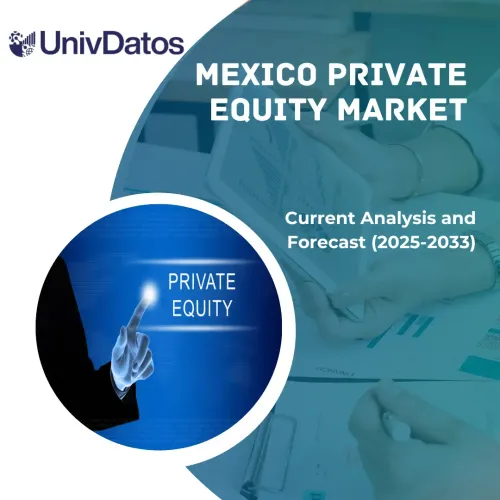保険レーティングプラットフォーム市場:現状分析と予測(2024年~2032年)
デプロイメントモード(オンプレミスおよびクラウド)の重視; アプリケーション(自動車、家庭、オートバイ、その他); および地域/国
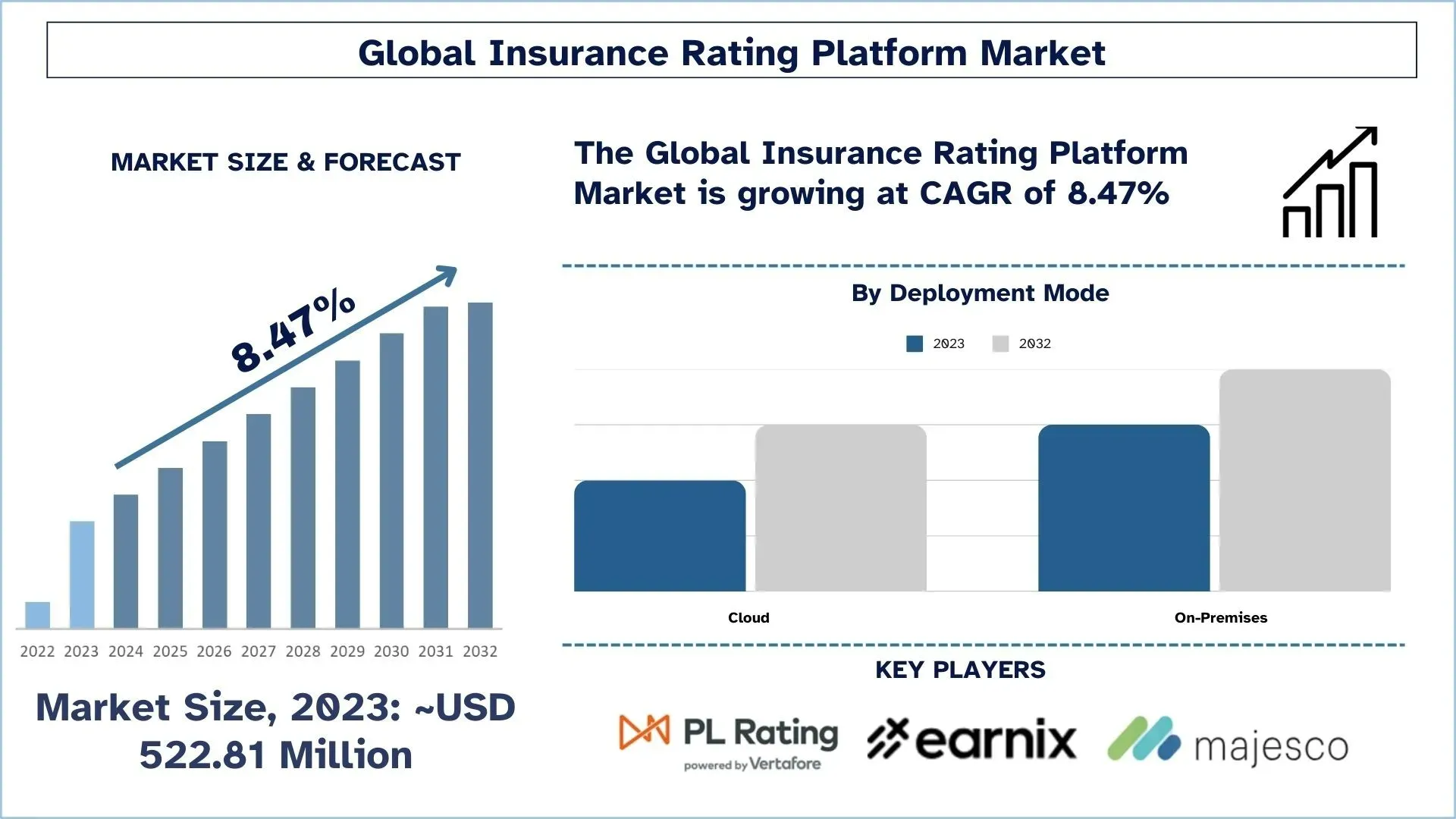
世界の保険料率プラットフォーム市場規模と予測
世界の保険料率プラットフォーム市場は、2023年に5億2281万米ドルと評価され、予測期間(2024年~2032年)中に約8.47%の力強いCAGRで成長すると予想されています。これは、顧客が求めるカスタマイズされた保険契約やダイナミックな価格設定が、保険会社にAIを活用したリアルタイムでリスクを評価する料率プラットフォームを活用させるためです。
保険料率プラットフォーム市場分析
世界の保険料率プラットフォーム業界は、保険セクターにおける、より優れたデータに基づいた保険料の作成およびリスク評価サービスのニーズにより成長しています。これらのプラットフォームは、人工知能とビッグデータツールを使用して、アンダーライティング手順を自動化すると同時に、より適切な価格設定を行い、顧客へのサービスを向上させています。市場は、自動車保険契約におけるテレマティクスの利用増加、および注意義務基準の向上、さらに企業がデジタルシステムに移行していることによって成長しています。市場の成長は、顧客が求める不正ツールとクラウド機能を備えた即時の保険契約調整によってもたらされています。
世界の保険料率プラットフォーム市場のトレンド
このセクションでは、当社の調査専門家チームが見出した、世界の保険料率プラットフォーム市場のさまざまなセグメントに影響を与えている主要な市場トレンドについて説明します。
自動車セグメントが業界を変革
自動車カテゴリは、リスクをより正確に評価するための高度な分析の必要性を高めるため、保険料率プラットフォーム業界への最大の貢献者です。保険会社は、AIシステムと車両接続を使用して、利用習慣と行動に基づいたカスタムメイドの保険料を提供することで、事業の成長を支援できます。動的な料率システムのニーズは、車両販売の増加、保険を強制する規則、および電気自動車と自動運転車への移行から高まっています。保険担当者は、デジタル請求を処理し、不正をより適切に検出できるようになり、最新の料率システムをより効果的に使用できます。
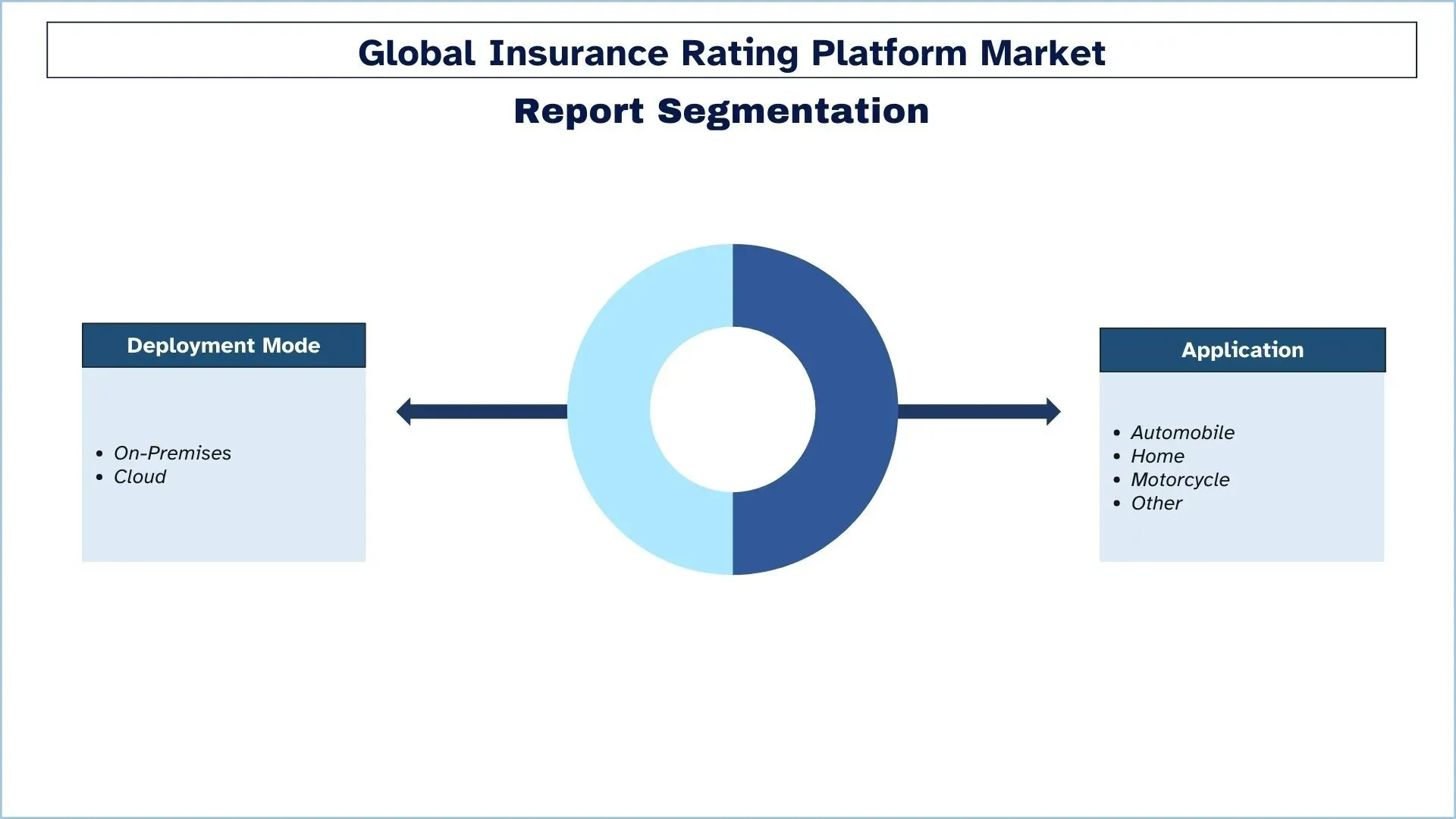
北米は予測期間中にかなりの速度で成長すると予想されています。
北米の保険料率プラットフォーム市場は、現地の保険事業の強み、迅速な技術導入、規制当局からの厳格な規則により成功を収めています。より多くの保険会社が高度な技術を使用して、リスクをより適切に分析し、価格設定システムを簡素化すると同時に、顧客へのサービスを向上させています。保険会社は、UBI保険が医療および自動車保険契約で離陸するため、高度な料率プラットフォームをより多く使用しています。保険技術会社は、市場を拡大するために、デジタルサポート事業の増加と協力しています。パーソナライズされた保険契約と即時見積に対する現在の顧客のニーズは、保険会社に料率技術のアップグレードを促しています。
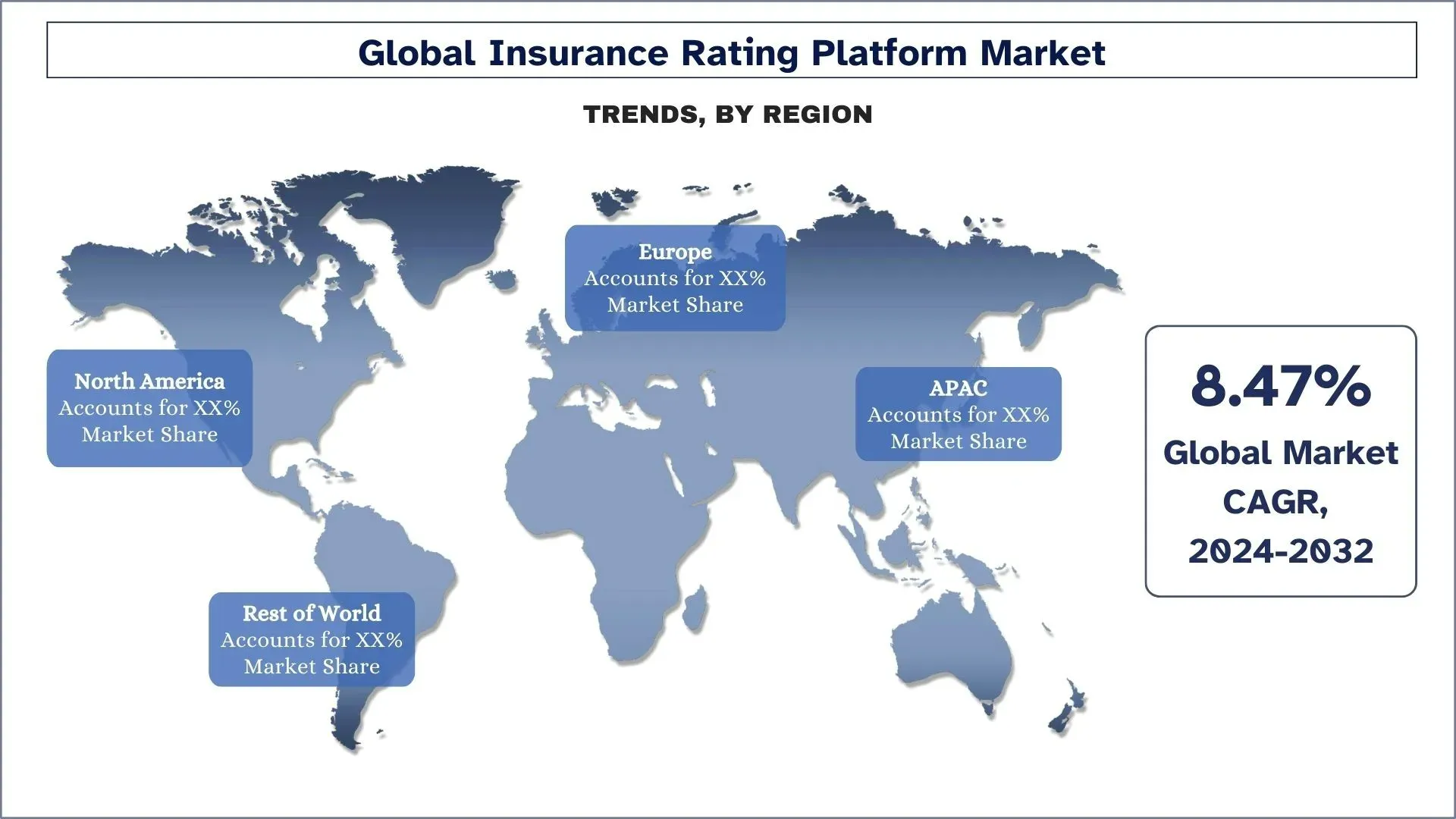
世界の保険料率プラットフォーム業界の競争状況
世界の保険料率プラットフォーム市場は競争が激しく、多数のグローバルおよび国際的な市場プレーヤーが存在します。主要なプレーヤーは、市場でのプレゼンスを強化するために、パートナーシップ、契約、コラボレーション、新製品の発売、地理的拡大、M&Aなど、さまざまな成長戦略を採用しています。
主要な保険料率プラットフォーム企業
市場の主要なプレーヤーには、Vertafore, Inc. (Roper Technologies)、Applied Systems, Inc. (HELLMAN & FRIEDMAN LLC)、Insurance Technologies Corporation (Zywave)、HawkSoft, Inc.、Sapiens International、Buckhill d.d.、Majesco (Thoma Bravo)、OneShield、Duck Creek Technologies (Vista Equity Partners)、Earnixなどがあります。
世界の保険料率プラットフォーム市場レポートのカバレッジ
レポートの属性 | 詳細 |
基準年 | 2023年 |
予測期間 | 2024年~2032年 |
成長の勢い | CAGR 8.47%で加速 |
2023年の市場規模 | 5億2281万米ドル |
地域分析 | 北米、欧州、APAC、その他の地域 |
主要な貢献地域 | 北米は予測期間中に市場を支配すると予想されています。 |
対象となる主要国 | 米国、カナダ、ドイツ、英国、スペイン、イタリア、フランス、中国、日本、インド |
プロファイリングされた企業 | Vertafore, Inc. (Roper Technologies)、Applied Systems, Inc. (HELLMAN & FRIEDMAN LLC)、Insurance Technologies Corporation (Zywave)、HawkSoft, Inc.、Sapiens International、Buckhill d.d.、Majesco (Thoma Bravo)、OneShield、Duck Creek Technologies (Vista Equity Partners)、Earnix |
レポートの範囲 | 市場のトレンド、推進要因、抑制要因。収益の推定と予測。セグメンテーション分析。需要と供給側の分析。競争状況。企業プロファイリング |
対象セグメント | 展開モード別。アプリケーション別。地域/国別 |
このレポートを購入する理由:
この調査には、認証済みの主要な業界専門家によって確認された市場規模と予測分析が含まれています。
このレポートは、全体的な業界のパフォーマンスを一目で簡単に確認できます。
このレポートでは、主要な業界の同業他社の詳細な分析を取り上げ、主に主要な事業財務、タイプポートフォリオ、拡大戦略、および最近の開発に焦点を当てています。
業界で優勢な推進要因、抑制要因、主要なトレンド、および機会の詳細な調査。
この調査では、さまざまなセグメントにわたる市場を包括的に網羅しています。
業界の地域レベルの詳細な分析。
カスタマイズオプション:
世界の保険料率プラットフォーム市場は、要件またはその他の市場セグメントに応じて、さらにカスタマイズできます。これに加えて、UMIは、お客様独自のビジネスニーズがある可能性があることを理解しています。お客様の要件に完全に適合するレポートを入手するために、お気軽にお問い合わせください。
目次
世界の保険格付けプラットフォーム市場分析(2024年~2032年)の調査方法
世界の保険格付けプラットフォーム市場の過去の市場分析、現在の市場規模の推定、および将来の市場予測は、主要地域における世界の保険格付けプラットフォームの採用を構築および分析するために行われた3つの主要なステップでした。徹底的な二次調査を実施して、過去の市場データを収集し、現在の市場規模を推定しました。次に、これらの洞察を確認するために、多数の調査結果と仮定を考慮しました。さらに、世界の保険格付けプラットフォーム市場のバリューチェーン全体にわたる業界の専門家との徹底的な一次インタビューを実施しました。一次インタビューを通じて市場数値を仮定および検証するために、トップダウン/ボトムアップアプローチを採用して、市場全体の規模を予測しました。その後、市場の内訳とデータ三角測量の手法を採用して、業界のセグメントおよびサブセグメントの市場規模を推定および分析しました。詳細な方法を以下に説明します。
過去の市場規模の分析
ステップ1:二次ソースの詳細な調査:
年次報告書と財務諸表、業績プレゼンテーション、プレスリリースなどの企業内部ソース、およびジャーナルと記事、政府刊行物、競合他社のレポート、サードパーティのデータベース、その他の信頼できる刊行物などの外部ソースを通じて、世界の保険格付けプラットフォーム市場の過去の市場規模を取得するために、詳細な二次調査を実施しました。
ステップ2:市場セグメンテーション:
世界の保険格付けプラットフォーム市場の過去の市場規模を取得した後、主要地域のさまざまなセグメントおよびサブセグメントに関する過去の市場の洞察とシェアを収集するために、詳細な二次分析を実施しました。展開モード、アプリケーション、地域などの主要なセグメントは、レポートに含まれています。さらに、地域におけるテストモデルの全体的な採用を評価するために、国レベルの分析を実施しました。
ステップ3:要因分析:
さまざまなセグメントとサブセグメントの過去の市場規模を取得した後、世界の保険格付けプラットフォーム市場の現在の市場規模を推定するために、詳細な要因分析を実施しました。さらに、展開モード、アプリケーション、および世界の保険格付けプラットフォーム市場地域などの従属変数と独立変数を使用して、要因分析を実施しました。世界の保険格付けプラットフォーム市場におけるトップパートナーシップ、M&A、事業拡大、および製品の発売を考慮して、需要と供給側のシナリオの徹底的な分析を実施しました。
現在の市場規模の推定と予測
現在の市場規模の算出:上記の3つのステップからの実用的な洞察に基づいて、現在の市場規模、世界の保険格付けプラットフォーム市場の主要プレーヤー、およびセグメントの市場シェアに到達しました。必要な割合シェアの分割と市場の内訳はすべて、上記の二次的アプローチを使用して決定され、一次インタビューを通じて検証されました。
推定と予測:市場の推定と予測のために、ステークホルダーが利用できる推進要因とトレンド、制約、および機会を含むいくつかの要因に重みが割り当てられました。これらの要因を分析した後、適切な予測手法、つまりトップダウン/ボトムアップアプローチを適用して、世界の主要市場全体のさまざまなセグメントおよびサブセグメントについて、2032年の市場予測に到達しました。市場規模を推定するために採用された調査方法には、以下が含まれます。
収益(米ドル)と、国内の主要市場全体における世界の保険格付けプラットフォーム市場の採用率の観点からの業界の市場規模
市場セグメントおよびサブセグメントのすべての割合シェア、分割、および内訳
提供されるタイプに関する世界の保険格付けプラットフォーム市場の主要プレーヤー。また、これらのプレーヤーが急速に成長する市場で競争するために採用する成長戦略。
市場規模とシェアの検証
一次調査:主要地域全体のトップレベルのエグゼクティブ(CXO/VP、営業責任者、マーケティング責任者、運用責任者、地域責任者、カントリーヘッドなど)を含むKey Opinion Leaders(KOL)との詳細なインタビューを実施しました。次に、一次調査の結果を要約し、統計分析を実施して、述べられた仮説を証明しました。一次調査からのインプットを二次的な調査結果と組み合わせることで、情報を実用的な洞察に変えました。
さまざまな地域における一次参加者の分割
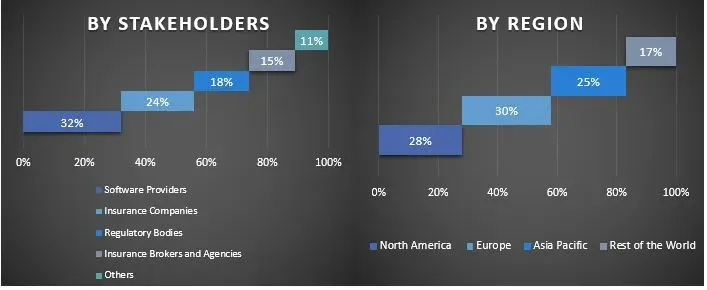
市場エンジニアリング
データ三角測量の手法を採用して、市場全体の推定を完了し、世界の保険格付けプラットフォーム市場の各セグメントおよびサブセグメントの正確な統計数値に到達しました。世界の保険格付けプラットフォーム市場の展開モード、アプリケーション、および地域におけるさまざまなパラメーターとトレンドを調査した後、データをいくつかのセグメントとサブセグメントに分割しました。
世界の保険格付けプラットフォーム市場調査の主な目的
世界の保険格付けプラットフォーム市場の現在および将来の市場トレンドは、調査で特定されました。投資家は、調査で実施された定性的および定量的分析に基づいて、投資に関する裁量を判断するための戦略的な洞察を得ることができます。現在および将来の市場トレンドは、地域レベルでの市場全体の魅力を決定し、産業参加者が未開拓の市場を利用して、ファーストムーバーアドバンテージから支援を受けるためのプラットフォームを提供しました。調査のその他の定量的な目標には、以下が含まれます。
価値(米ドル)の観点から、世界の保険格付けプラットフォーム市場の現在の予測と市場規模を分析します。また、さまざまなセグメントおよびサブセグメントの現在の予測と市場規模を分析します。
調査のセグメントには、展開モード、アプリケーション、および地域が含まれます。
業界の規制の枠組みを定義および分析します。
さまざまな仲介業者の存在に伴うバリューチェーンを分析するとともに、業界の顧客および競合他社の行動を分析します。
主要地域の世界の保険格付けプラットフォーム市場の現在および予測市場規模を分析します。
レポートで調査された地域の主要国には、アジア太平洋、ヨーロッパ、北米、およびその他の地域が含まれます。
世界の保険格付けプラットフォーム市場の企業プロファイルと、プレーヤーが急速に成長する市場を維持するために採用する成長戦略。
業界の地域レベルの詳細な分析
よくある質問 よくある質問
Q1: グローバル保険レーティングプラットフォーム市場の現在の市場規模と成長の可能性は何ですか?
Q2: グローバル保険レーティングプラットフォーム市場の成長を牽引する要因は何ですか?
AIを活用した分析は、リスク評価の精度と価格設定の効率を向上させ、保険会社は自動化された料率算出ソリューションへの依存度を高めています。
Q3:アプリケーションカテゴリー別で、世界保険格付けプラットフォーム市場シェアが最も大きいセグメントはどれですか?
自動車カテゴリーは、アプリケーションセグメント別に見ると、世界の保険格付けプラットフォーム市場で最大のシェアを占めています。
Q4: グローバル保険レーティングプラットフォーム市場における新たな技術とトレンドは何ですか?
ブロックチェーンは、保険料計算における透明性とセキュリティを強化し、不正行為や紛争を減少させます。
Q5:世界の保険格付けプラットフォーム市場を支配している地域はどこですか?
予測期間中、北米が市場を支配すると予想されています。
関連 レポート
この商品を購入したお客様はこれも購入しました



